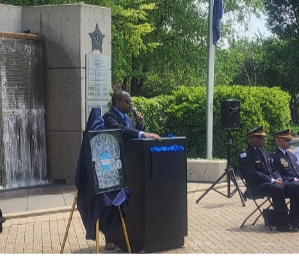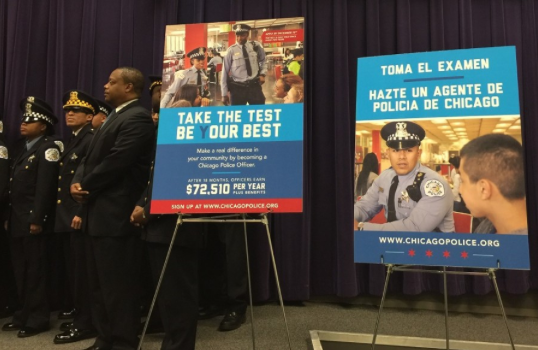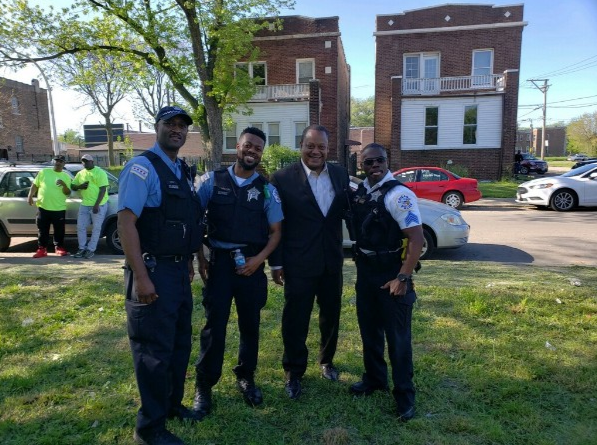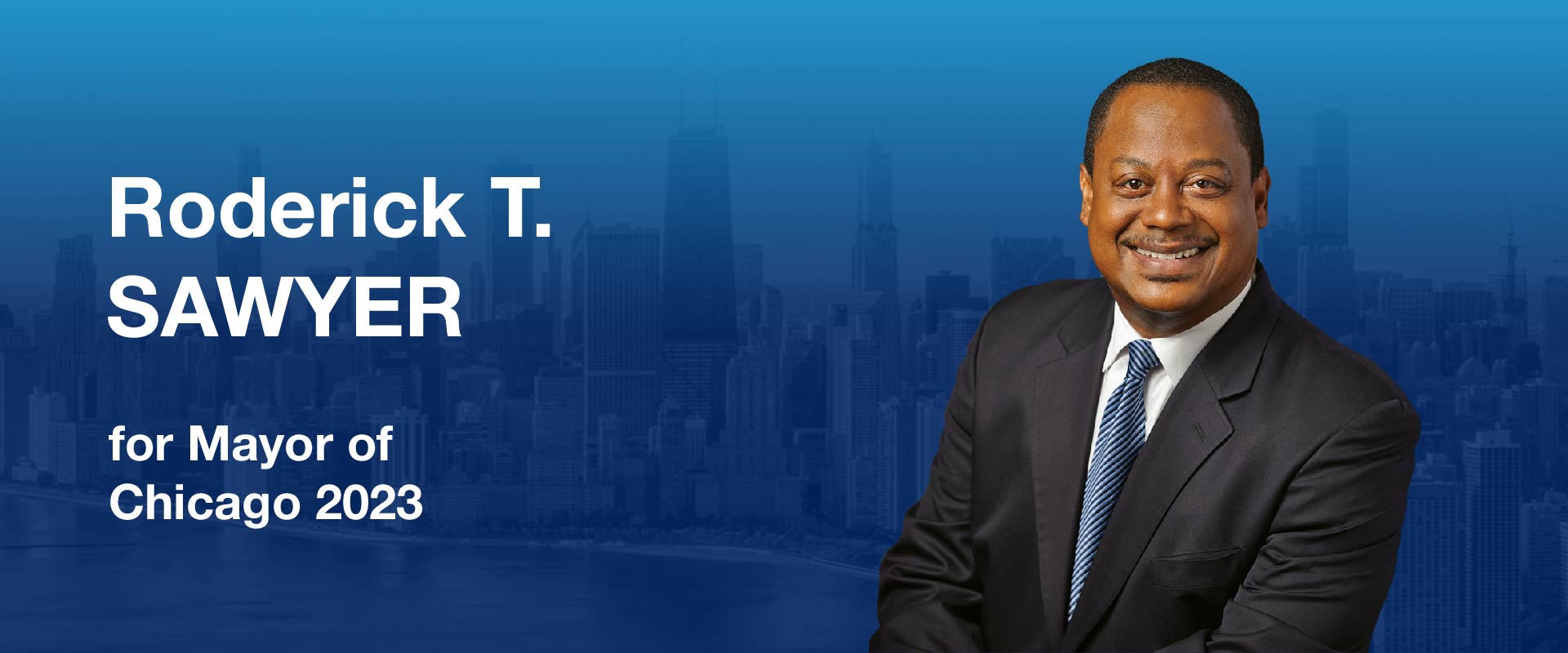Public Safety Plan

Chicago has to do nothing less than re-invent our police force to be a thriving, efficient part of a healthy city, benefitting all of our citizens including our most marginalized people.
In developing a critical Public Safety plan, I spoke with communities across the city and police officers of every rank and career stage. I also used my experience from years violence prevention, my lived experience as a lifelong resident of Greater Grand Crossing and my 12 years as an alder taking the lead on our most pressing police issues.
My multi-faceted plan reflects the police reform fight I led for more than seven years – including some of the most sweeping, positive changes in the nation. I know a reformed department, sensitive to all populations – Black, Latino, LBGTQ+, homeless, undocumented – will be far more effective in all communities rather than being feared in some.
As Mayor, I will immediately implement fundamental change in the Chicago Police Department that have both an immediate impact on public safety and serve the long-term improvement of the department and the lives of the people our officers serve and protect.
My public safety plan addresses issues that have historically plagued our city – high crime, inequities and social injustice, and the increase in what I call “crime anxiety in all 77 neighborhoods – while addressing the lack of resources given to our officers and civilian public safety employees.
Priority No. 1, of course, is to recruit more than 1,000 high-quality candidates to become Chicago Police Officers, replenishing the ranks of our depleted force, as officers have left in droves under the current administration.
In order to do that I am announcing a slate of improvements to make our officers safer, more effective, better trained, and healthier, both physically and mentally. These improvements will be a recruiting tool to attract the best talent for a diverse, modernized, reformed, highly trained department that will become a national model.
At the top of this list is 20-year pension vesting. Officers would be able to retire from CPD with a full pension after 20 years. In addition to the obvious financial benefit to the officers, it means CPD will be continuously refreshed with young officers trained in the most current methods and reflecting inclusive values that change with each generation.
Of course there will always be a place for those who want to stay with our department beyond 20 years. Experience is an incredibly valuable asset. We simply must recognize younger people don’t have the same view on working one career their whole life, and my plan reflects a more modern and realistic approach to recruiting the best officers.
Many others in this race have announced public safety plans that address housing, education, job opportunities and a long list of inequities we all want to fix. I agree, those issues are root causes of crime, and I have plans to address all of them.
We must never forget the ultimate crime deterrents are education, employment and opportunity. Violence is a symptom of public policy failings and neglect in housing, education, public health, and many other areas. Since our budget and values haven’t reflected that for decades, we desperately need a supplement to police protection that provides these specialized services.
What we need immediately, however, and what my plan addresses, is how we make Chicago safer NOW!

Promoting from within not only gives us more effective leadership from Day One, it sends an important message to our officers that their voices and experience matter, and that we will always look to them for our biggest and most rewarding promotions.
Geographical Integrity – Putting Officers Back in Our Neighborhoods
In order to best protect Chicagoans, CPD must make inroads in local communities. It is important for police to be visible in their communities and know their residents. We have seen our neighborhoods depleted of police officers, not just by a mass exodus, but by reassignments to various specialized units. That policy has failed.
›I will create incentives for officers to stay in their assigned districts for longer periods of time and refocus our efforts on community policing that allows officers to become acquainted with a community, and allows communities to become acquainted with them. Officers who stay in their assigned districts for extended periods of time help local residents by building trust and protecting their neighborhoods.

Fixing 911 Service
Our emergency response system is badly broken, putting everyone at risk. Many who call 911 are in life-threatening danger and need and deserve a timely response. Our residents are paying for it by suffering through surges in violent crimes, carjacking’s, and in at least 29,000 cases according to a recent report, waits of an hour or more for help after 911 calls.
Our system needs a complete technical overhaul, which I would begin immediately.
At the moment, the city does not have enough officers to respond, which has led to long response times or, sadly, no response at all. There also is a disparity with calls being answered much faster in some areas with nearly double the average wait time in others.
More than half of all 911 calls are non-violent problems and could be handled by our Crisis Assistance Response and Engagement (CARE) program – which came from the City Council Health and Human Relations Committee I chair – if it were given more people and resources. Further development of this CARE program will be faster and more affordable than having police officers respond to calls for which they are neither needed nor well equipped.
This approach would dovetail with diversion programs I will implement to get people into mental health clinics, drug treatment facilities, hospitals and other alternatives to being arrested.
Ensuring Safety on the CTA and Other Vital Services
The CTA is one of the city’s great assets, providing an absolutely vital service for our vibrant economy. Workers from every corner of the city depend on the CTA to get to and from work, especially for those who are the backbone of our service industry, from cooks and waitstaff to retail workers, hospital staff and those who support our most essential services.
The ability to travel by bus or train to sporting and cultural events, or a simple evening out, are of immeasurable importance to locals and visitors alike.
The surge in crime on our public transit system has harmed our local economy and caused many to live in fear each time they have to go to their jobs. Some have abandoned the system altogether.
K-9 patrols are an insufficient, unsophisticated tool that make our El system feel like a police state while offering little protection.
I would immediately ask the Federal Government to assign federal police at our airports and use the 249 officers – all of whom are experienced, senior officers – into more urgently needed roles. That will free up other officers for a public transit team that would focus on the most high-crime parts of the CTA. They would create a presence on the platforms, ride trains during key times, and deter crime while reassuring riders. This urgent program could be a short-term solution until we restore safety and public confidence, or it could become a permanent fixture.
The CTA needs state-of-the-art video monitoring systems so riders know every action is being recorded, if not monitored in real time. This will make riders feel safer, reducing not only the risk of a serious crime, but also forms of harassment or intimidation.
The video would be monitored by rapid response teams that can direct resources to a bus or train car where there is potential danger, keep careful watch over vehicles that might be boarded by crime suspects, monitor developing situations, and direct police resources to the location of people in trouble.
In addition to increased safety, this will lead to fewer delays and faster travel times.
The CTA’s safety is a key to its success, and the CTA’s success is crucial to the city’s success.
Officer Wellness Leads to Improved Safety
A key step in our public safety crisis is replenishing the depleted officer ranks in our police department. Far too few officers are currently holding CPD together and they are paying for it with great sacrifice to their personal lives and mental health.
Our city has witnessed the tragedy of 23 police suicides since 2018, seven of them in 2022 alone, a sad testament to the way the department has struggled and has been mismanaged. The suicide rate within CPD is 60 percent higher than the national average, according to a 2017 report.
We are treating our police officers with the same neglect as we have treated our veterans. We ask so much of them and return very little in the way of support when the job causes them damage.
More than 1,000 CPD officers worked 11 or more consecutive days in April and May of 2022, according to an Office of the Inspector General report. Many shifts are now 12 hours long. Days off are frequently canceled with little notice. Our current Mayor has ignored and repeatedly underestimated this problem, last summer claiming officers have an “incredible’’ amount of down time.
Immediate measures
- Take the pressure off our police by re-hiring retired officers to perform a variety of functions, from responding to 911 calls ONLY WHEN the victim is safe and the crime is no longer in progress, to administrative work and other non-emergency tasks.
- Change the CPD policy that doesn’t allow police officers to return to the job if they leave. We’ve had good officers retire due to stress, schedule and poor leadership who might come back to the department if it makes structural changes under a new mayor.
- 20-year pension vesting, down from the current 25-30 years. This will be an outstanding recruiting tool in a time when the entire nation is facing a shortage of police officers, create a younger, more dynamic force that is more closely connected to evolving generational culture, and reflect the most up-to-date knowledge on policing.
- Initiate immediate measures to give police robust mental health support, including access to therapists and check-ins with mental health counselors as a routine habit. We must remove any remaining stigma of mental health maintenance for officers in a job that is stressful, traumatic and demands so much of them. Until recently the city offered one mental health professional for every two police districts – or 11 to serve all 22 CPD districts. That is woefully inadequate. The number was increased to 22 clinicians, one for each district, which still is nowhere near enough. Even if the 22 positions are filled, that is about 1 clinician for every 550 officers. I plan on increasing the number of clinicians even more so help is available immediately to officers facing a mental health crisis, and offer health insurance that covers private mental health counseling.
- Create additional incentives, including enhanced education for officers. Officers should have the ability to pursue further study in anything related to public safety – psychology, public policy, social services, criminology and other topics so they can develop skills about which they are passionate to further their careers within the department or beyond.
- Invest in comprehensive police training and make ongoing training a normal part of the job. Officers shouldn’t feel as if they are being punished because we have a reactionary training program, only demanding they learn about de-escalation and community engagement after there has been an incident. Ongoing education should be a foundational part of the job, making officers feel empowered and keeping them informed on the most modern strategies and tactics.
- Begin an immediate, widespread recruiting campaign that touts our reform measures, our desire to create a better, more modern, highly respected and deeply trusted police department that will become a national model.
- Make officers aware that policing doesn’t have to be their job for 40 years. A police career can be a fantastic new beginning that goes on to higher education, advanced degrees, the legal profession, and many others. The notion that the next job you take must be the last one you work is antiquated thinking and doesn’t reflect generational behavior.
- Offer additional benefits and incentives for those who do choose to make policing their life’s career. These should include career development programs, and milestone perks, for example: interest free home loans after 10 years, scholarship programs for their children at 20, and more benefits that show appreciation for their tenure and add to their quality of life.
- Train our new recruits in the most modern methods of community engagement and other modern police tactics, and develop them in a culture of openness, transparency and accountability that reflects our new police reform modePolice want to be a valued part of the communities they serve. The best thing we can do is to recruit and retain quality officers, keep them healthy and effective, and give them all of the resources and tools they need to succeed in a department they are proud to represent.
Mental Health and Social Service Professionals Should Supplement Police Services
A record number of officers are leaving CPD. While recruiting new officers to stem the record surge in departures under the current mayor is a crucial and immediate need, substantial changes are required. Our police officers have their hands full solving crimes and serving as neighborhood ambassadors. It is well-established that they can’t be drug and mental health counselors, as well.
Police need to have the capacity to partner with mental health and social services professionals to provide wrap around services for complex situations. Sometimes these professionals could supplement police efforts, with a response that includes fewer officers. Many non-violent cases can be handled exclusively by these professionals.
Chicago has nearly tripled per capita police spending since 1964 to about $600 per resident in 2020. In that same time the case clearance rate on many crimes, especially murder, has fallen as police have had to take on more and more duties. These increases have come at the same time the city has drastically cut services that support strong individuals, families and communities.
Enhanced Crime Data Transparency
CPD must improve transparency with respect to crime data records. Due to Freedom of Information Act lawsuits and a 2019 consent decree, the public now has more access to police data than ever before. I would ensure this trend continues so everyone knows whether crime is improving or worsening and whether our clearance rates are improving.
A Sawyer Administration will have a panel of police advisors on issues where we have failed in the past to make best use of this data. These will include important topics such as police tactics, new strategies and technology and the morale and mental health of our officers, but also representatives of our vulnerable communities. I will monitor the well being of minority, LBGTQ+, homeless, and undocumented populations, and every group that lacks a voice or adequate representation.
I also won’t play games with our numbers and data, the way our current mayor balanced the 2021 budget by “eliminating” 614 police positions that were desperately needed but temporarily vacant. Transparency is vital to a functioning democracy and to Chicago’s residents.
Continually Evolving
Policing requires constant evolution and updating. We have access to tools and techniques that were unimagined just 20 years ago.
While we have adopted the computer models, cameras, drones and other tools, we have been slow to change the very way our police think and interact with the people they serve.
We are only as good as the way our police interact with and protect our most vulnerable people. There is a history of policing in Chicago that causes fear in some of our communities, and in a Sawer Administration we will work every day not only to change the root causes of that fear, but to continually demonstrate our support to these vulnerable communities.
Changing Police Culture
Chicago’s police reform and accountability must become not just policy, but a guiding principle for our officers and their leaders.
We have to develop an environment in which officers feel they are working WITH our communities, not against some of them. Any “Us. vs. Them” mentality must be replaced with officers feeling like they are at one with the people they are protecting.
In short, the changes I will make are not easy ones, but they are vital. Police officers are held to a higher standard. In order to meet that standard, the city’s law enforcement
personnel must be accountable for their actions and protect and serve everyone. I will make Chicago’s Police Department the best trained in the nation. This will benefit the city’s residents and create much needed change. Transparency and accountability are the bedrock for a robust relationship between police officers and the people they serve.


